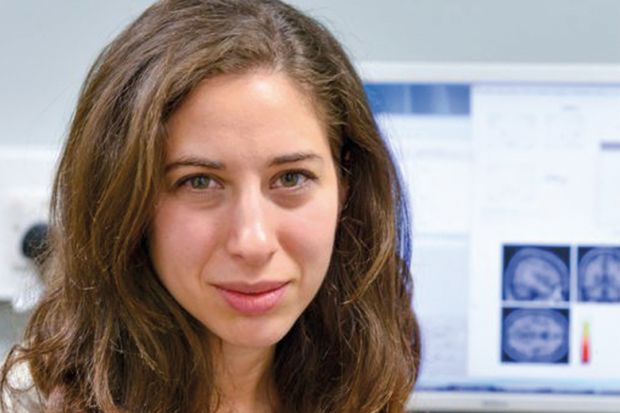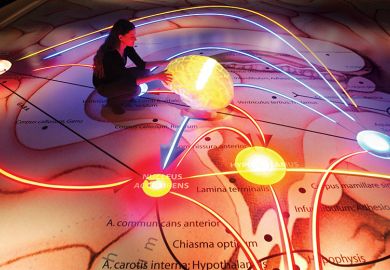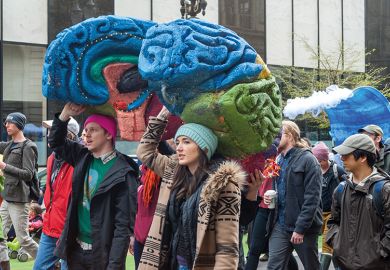Sarah Garfinkel is professor of neuroscience and psychiatry at the Brighton and Sussex Medical School, and the Sackler Centre for Consciousness Science at the University of Sussex. She is a leading expert on interoception, the felt sense of the activities of one’s internal organs. Last year she was named one of Nature’s “rising stars” of science.
Where and when were you born?
University College Hospital in London on 24 March 1980. Because I was born in a university hospital, I was enrolled as a control participant into a longitudinal study investigating the effect of premature birth on cognitive and neural functioning.
How has this shaped who you are?
I would like to think that this early brush with research was destiny for my career, but I think I was more shaped by other factors, such as being lucky enough to be born into a very supportive and loving family.
How did it feel to be named as one of Nature’s rising stars?
I still can’t believe it. I was a little dyslexic and my school never expected much from me. I also had no expectation of doing well; I just learned to do things because I loved them and I worked hard because things did not come easily to me. Being named a rising star spins my head a little and I find it best just to focus on the science, otherwise I can get a bit shy.
Tell us about your research.
When we think of the senses, we tend to think of vision, hearing, touch, etc. But these are classified as “exteroceptive senses”; that is, they tell us something about the outside world. In contrast, interoception is a sense that informs us about our internal bodily sensations, such as the pounding of our heart, the flutter of butterflies in our stomachs or feelings of hunger. The way we think and feel is influenced by these internal signals. I measure different dimensions of interoception, including neural markers of internal bodily signals, to show how interoceptive processes help shape cognition and emotion. I investigate altered interoceptive mechanisms in different clinical conditions such as anxiety, schizophrenia and autism to detail how aberrant brain-body signalling may contribute to alterations in mood and thought.
Is there much about the human heart that we are yet to understand?
Yes. The heart is so beautiful. It does not beat regularly, but instead has embedded within its temporal patterns signatures associated with different states, such as anticipation. I have shown that signals from our heart can interact with the brain to disrupt memories and alter decision-making. The effect of heart signals on so many other types of processing still needs to be understood. Moreover the heart-brain channel appears altered in many clinical conditions and I very much hope that further investigation of this will ultimately lead to novel treatments in the future.
What is the biggest misconception about your field of work?
When people hear I work on the heart and how signals from the heart can shape how we think and feel, they might think it is a little light and fluffy. But I love the basic science of it. I’m all about scanning brains with concurrent autonomic monitoring and manipulation.
What kind of undergraduate were you?
A very scatty but enthusiastic one. I was always losing my notes. Luckily my good friend Jessica Murphy let me use her notes to revise for the exams. I once went up to a lecturer (Karen Mccomb) and asked if I could ask her half a question. I think I meant a quick question, but I’m not sure. I guess I was maybe a little unusual.
What’s your most memorable moment at university?
As an undergraduate it was falling asleep in lectures, and having Jessica throw balls of paper at my head to wake me up. Now when the (occasional) undergraduate falls asleep in my lecture, I am very understanding.
What divided your life into a ‘before’ and ‘after’?
After I graduated I was lost about what to do, and then one day over the summer the phone rang and it was my old department at Sussex offering me a PhD position. Someone had dropped out and a place had suddenly appeared. I would never have had the confidence to apply; that phone call changed my life.
Tell us about someone you’ve always admired.
Different people at different stages. When I was eight, I went through a suffragette phase and I adored the Pankhursts. As a teenager I was very taken with the writings of Gitta Sereny, and she inspired a fascination about the basis of morality. At school I didn’t have the easiest time with friends, and two teachers (Vivien Molinari and Vivien Preston) were very inspirational and supportive – we still keep in touch today. And now I am lucky enough to be surrounded by so many incredible scientists. The ones I admire most are those who combine brilliance with kindness, such as Hugo Critchley, Karl Friston and Uta Frith.
What are the best and worst things about your job?
The hours are endless, there is always more to do. Also, the more successful you are, the further away you get from the day-to-day aspects of the research. But I am lucky enough to mentor a group of wonderful scientists, and I still get to look at data. The best thing for me is the excitement of new results. It is the most wonderful feeling.
What do you do for fun?
Relaxing and chatting with friends, family and loved ones. I also enjoy drawing graphs.
What saddens you?
My heart breaks at the current state of the world, the rise of populism and the far right. I am deeply saddened by Brexit. My lab is a real international lab, with amazing scientists from Portugal, Sweden, Germany and Spain. The scientific community is global, dependent on international research grants, collaborations and free and easy movement. Watching Brexit unfold driven by lies, ineptitude and empty rhetoric is depressing and deeply frustrating.
What one thing would improve your working week?
More time to analyse my data and draw beautiful graphs.
Appointments
Rodney Priestley has been named Princeton University’s first vice-dean for innovation. The professor of chemical and biological engineering will take up the role in February, overseeing all innovation and entrepreneurship activities on campus. Professor Priestley is involved in three industry-university collaborations himself, and is the founder of two university spin-outs. Pablo Debenedetti, Princeton’s dean for research, said that Professor Priestley “excels both in fundamental research and in the development and translation of intellectual property derived from his research into products and enterprises. He brings not only experience but also enthusiasm and creativity to this new position.”
Mark Fellowes has been confirmed as pro vice-chancellor (academic planning and resource) at the University of Reading, for a six-year term. The zoologist had held the role on an interim basis since August 2018, and was head of the School of Biological Sciences between 2010 and 2017. He joined Reading as a lecturer in 2000. Robert Van de Noort, Reading’s vice-chancellor, said that Professor Fellowes was “an outstanding leader with a clear focus on making changes that work for our people and our university”.
Jeffrey Brock has been appointed dean of Yale University’s School of Engineering and Applied Science, on a three-year term. The professor of mathematics is already dean of science in Yale’s Faculty of Arts and Science and will continue in that role.
Jaclyn Granick has been named Cardiff University’s first lecturer in modern Jewish history. She was previously a research fellow at the University of Oxford.
Joe Cullen has been named Pennsylvania State University’s new chief investment officer. He will take up the role in September, succeeding John Pomeroy, who retired in December after more than 17 years in the position.
Roland Greene will start his term as director of the Stanford Humanities Center at Stanford University next month. He is a professor of literature at the institution.
Register to continue
Why register?
- Registration is free and only takes a moment
- Once registered, you can read 3 articles a month
- Sign up for our newsletter
Subscribe
Or subscribe for unlimited access to:
- Unlimited access to news, views, insights & reviews
- Digital editions
- Digital access to THE’s university and college rankings analysis
Already registered or a current subscriber? Login










